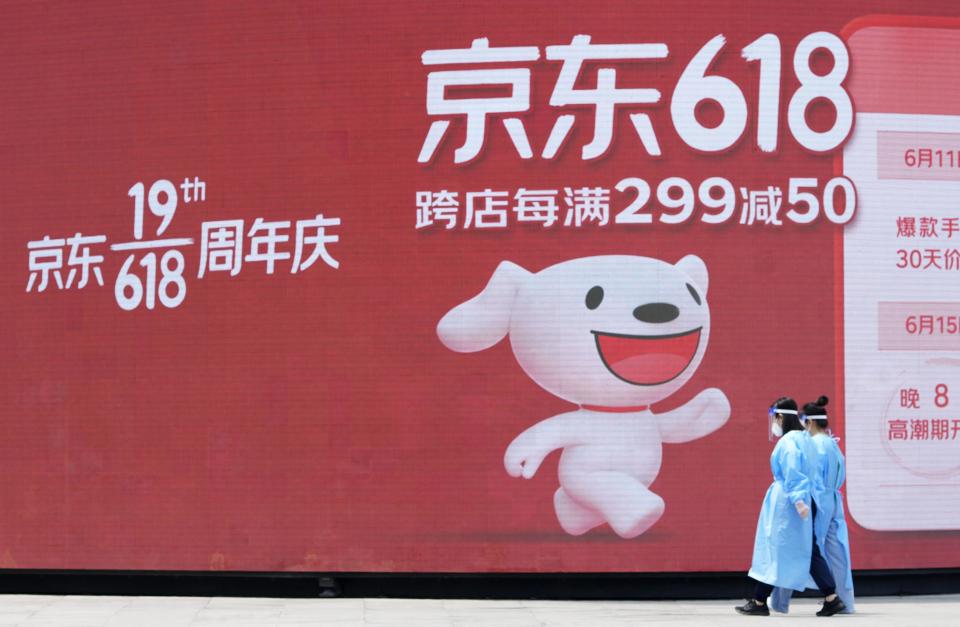Beauty Brands Eye 618 to Revive China Sales Post COVID-19 Lockdown
- Oops!Something went wrong.Please try again later.

SHANGHAI — This year’s 618 shopping festival may be crucial for beauty brands’ survival in the post-lockdown Chinese market.
The festival, which was originated by JD.com, has become China’s second-largest e-commerce shopping event after the Singles’ Day sales event on Nov. 11.
More from WWD
Lasting almost a month from late May to June 18, the total gross merchandise value of this year’s 618 reached 379.3 billion renminbi, or $56.47 billion, on JD.com, a 10.32 percent increase from last year. Its main competitor Alibaba said it has no plans to reveal the sales figures for 618.
The festival came at a critical time for brands to boost their 2022 revenues as the Chinese government eased COVID-19 lockdowns and pushed out economic support measures to stimulate the economy.
According to data from the National Bureau of Statistics, retail sales declined 6.7 percent year-over-year in May, to 3.35 trillion renminbi, or $496.16 billion. Cosmetics retail sales declined 11 percent year-over-year to 29.1 billion renminbi, or $4.3 billion, in the same period.
Brands were hoping that 618 and June sales numbers will offset some of the declines in April and May. ”The total 618 period should contribute 50 percent to second-quarter sales, so it’s quite important,” said Bernstein analyst Melinda Hu.
“618 in 2022 has taken on special significance as a surrogate metric for consumer confidence and a measure of economic recovery in post-COVID[-19] China,” said Elena Gatti, managing director at Azoya Europe.
This year’s discounts on Alibaba’s Tmall and JD.com are marginally higher than last year. Tmall encouraged higher single transaction amounts with a 50 renminbi off 500 renminbi coupon, as opposed to 30 renminbi off 200 renminbi the prior year. To support merchants, platforms have pledged to speed up transfers of presale deposits.

Kyodo/AP
According to a recent Bernstein report, the first 11 days of 618 contributed about 70 percent of sales to the festival’s total sales record. Leading premium brands such as L’Oréal, Shiseido and Estée Lauder bounced back quickly during the initial 11 days of 618 from May 26 to June 6, with triple-digit growth from brands such as La Mer, Helena Rubinstein, Guerlain and Armani beauty.
Local cosmeceutical giant Bloomage and Botanee also “trended positively” during 618’s initial sales period, due to their push for online exposure, but Shanghai Jahwa’s Dr. Yu was down 75 percent due to the Shanghai lockdown.
Beauty gadgets saw record sales as more people began to adopt at-home beauty regimes during the lockdown. Hair removal device Ulike, Face massager Ya-man, and skin tightening device Tripollar achieved top sales records during 618, according to Mktindex.com.
“Overall, we see a stronger performance among the premium brands,” according to Bernstein. “We think this is driven by pent-up demand, stock-up behavior of premium products during shopping festivals, and competitive promotions.”
Positive sales numbers from premium beauty brands also highlight the trend that Chinese shoppers, especially the twentysomething “research maniacs,” are willing to open their wallets for products with unique formulas, which are often seen in premium brands such as Helena Rubinstein, Chanel and La Prairie.
Livestreaming became an important part of brands’ revival playbook this year. Engaging livestreaming content also helped boost beauty and self-care brands’ presale conversion rate at the beginning of 618. According to data from ECdataway, beauty and self-care brands’ presale conversion rate of 65 percent leads all other industries on Tmall.
“Livestreaming is not a hard sell, it is about creating a shopping environment similar to what they would experience offline,” said Amy Xiong, key account and luxury beauty director at Tmall.
Xiong revealed that premium beauty brands’ self-livestreaming sessions, which are often led by brands’ own sales associates, achieved 50 percent year-over-year growth.
Helena Rubinstein became the first self-livestreaming luxury beauty brand to reach 100 million renminbi in sales.
“618 is a way for them to create more content outside of discounting. It’s about creating a sense of discovery and showing customers the latest trends,” said Xiong.
“Self-livestreaming is a comprehensive entrance for online traffic and the main place for selling products,” said Gatti.
Compared to key opinion leader livestreaming, “the brand self-livestreaming cut off the fixed cost, commission fee, the brand side control is stronger, the business model is easier to form a closed loop,” she added.
According to Azoya, the size of China’s livestreaming e-commerce market size is expected to rise by an additional 150.73 billion renminbi, or $22.45 billion, in 2022.
The festival also became a battleground for entrants such as Douyin, WeChat‘s video platform WeChat Channels. WeChat Channels can help brands tap into the social network’s 1.26 billion user base, while Douyin can “easily arouse user’s consumption interest by entertainment content,” said Gatti.
According to Bernstein, the ratio of cosmetics sales achieved on Tmall and Douyin is about 4 to 1. Based on the relatively lower value perception of the platform, premium beauty brands are still tiptoeing around Douyin, but Hu thinks Douyin will be the next key channel for premium brands.
“They just have to find a suitable strategy that preserves the brand image, ” said Hu.
Good 618 results aside, uncertainty still looms large. According to Internet Retail, e-commerce May retail data showed much stronger than offline growth. But “a key question for investors will be whether a strong June points to sustainably stronger trends in the second half of the year, or if pull forward of demand means July or the third quarter looks weaker than expected.”
Related:
China’s Retail Sales Contract, but Demand for Luxury Is Back
How Luxury Can Make Livestreaming Work in China
Bain Warns China Luxury Growth to Further Decelerate in 2022
Sign up for WWD's Newsletter. For the latest news, follow us on Twitter, Facebook, and Instagram.

